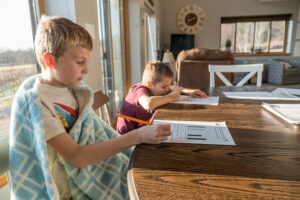Millions of British parents ‘dread’ the moment their child returns from school with maths homework.
As many as 47 per cent of the 2,000 mums and dads of children under 16 polled said mathematics is the hardest assignment of all. Just one in four parents believe they can confidently answer questions about algebra, while equations leave 35 per cent completely stumped.
Even basic times tables leave 14 per cent scratching their heads according to the poll by Akribian.
The research also revealed that parents are spending an average of 37 minutes a week helping their child with homework, with Maths and English being the subjects they spend most time supporting their child to complete.
Whilst parents are most anxious about maths, the research also found they feel apprehensive about science, languages and English.
“Maths is one of the most important subjects, yet there are too many adults who have no positive memories of learning it during childhood.
Negative attitudes become ingrained and can be passed onto their children. We need to turn this around.
There are different ways of learning and techniques have evolved tremendously over the years. Our research shows that adaptive, short adventure- based learning produces the best maths outcomes. With practice, anyone can be a ‘maths person’.”
- Martin Hassler Hallstedt, PHD, learning psychologist and co-founder of Count on me!
Reading versus maths
The study by OnePoll for Akribian – creators of the new app – also found that four in five British parents think it’s equally important to make sure that their kids are good at both reading and maths.
Just over a third (34 per cent) of parents said their English literacy skills at school were excellent, but out of all the subjects, 42 per cent find maths the most difficult.
Furthermore, 68 per cent of parents are worried helping their child with their homework might leave them more confused.
Maths anxiety
50 per cent of parents admitted to having ‘maths anxiety’ and two fifths (40 per cent) feel the same about reading. Maths anxiety is defined as anxiety about the ability to perform mathematical functions.
The level of anxiety varies from person to person along with the root cause. Researchers estimate that around 6-17% of the population could experience maths anxiety.
Of those with maths anxiety, 83 per cent are concerned that their own worries surrounding maths may affect their child’s attitude to the subject.
"There are many challenges for successfully supporting children’s mathematical learning and development, and parent’s anxieties around their own maths abilities is one of them.
Parents may feel worried or nervous when helping children with their homework. Research shows this can hinder children’s progress in maths and may make them feel anxious about it. There are ways we can help parents feel more confident though, and technology can play an important role. For example, educational maths apps can provide parents with bitesize understandings of their child’s maths development, as well as facilitating maths talk and play in everyday experiences.”
- Dr Laura Outhwaite, Senior Research Fellow at the Centre for Education Policy and Equalising Opportunities, University College London
As many as 52 per cent of mums and dads of children under 16 polled believe children are expected to learn too much these days.
Following this, 23 minutes was revealed as the average time kids do their homework before they lose interest. With maths, English and History found to be the subjects children have a particular low attention span for.
The study found that 61 per cent of parents rely on the internet to search the answers when helping their child with their homework.
“Maths is an essential subject, as important to life and career opportunities as reading. Still, reading to a child seems more natural than doing maths for many parents.
Regular exposure to maths is key to overcoming the anxiety some parents and children have. If possible associate maths with richer content than just numbers so your child can see and experience the meaning of maths, such as shopping, budgeting, planning a trip or even following a recipe.
Our maths app allows children to engage fully in adventure, fun and anxiety-free maths for 15 minutes a day - short bursts of exposure with minimal screen time. This encourages a happier state of wellbeing and is a more sustainable way of learning that results in long term knowledge retention. ”
- Martin Hassler Hallstedt, PHD, learning psychologist and co-founder of Count on me!
The subjects most likely to make parents feel anxious:
1. Maths
2. Science
3. Languages
4. English
5. History
6. Music
7. Geography
8. Art
9. RE
10. Drama
Research carried out by OnePoll on behalf of Akribian. Date: 12/11/21 – 13/12/21. Sample size: 2000 parents with children aged 5-16 years.
Count on me! can help children overcome maths anxiety
Research has shown that children who practice maths by playing a game-embedded app such as Count on Me! improve their skills by 60 percent. Count on Me! is for children aged 6-9 years to play on iPads based on a unique concept of Game-Embedded Teaching (GET) which is proven to accelerate learning and support maths home learning.
Developed using cognitive behavioural therapy (CBT) combined with advanced gaming technology, the game helps children learn and master early maths concepts such as pattern recognition, addition, subtraction, multiplication, division and equalities.


